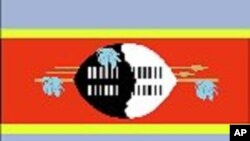A founding member of Swaziland’s banned opposition People’s United Democratic Movement (PUDEMO) party said Swazis expect King Mswati III to make meaningful democratic reforms rather than hold an insincere “people’s parliament.”
Tuesday, the king began a three-day people’s assembly called the “sibaya” to allow Swazis to express their views about the country’s current and future direction.
PUDEMO founding member Mphandlana Shongwe said his party will attend the assembly, although he views it as an exercise in futility because the people are not free to speak against the king.
"We want go there and prove to the whole world that this is not a people’s parliament, but this is just a window dressing process where they are abusing our traditional culture into believing that there is a real dialogue that is taking place,” he said.
Shongwe said people are not free to speak freely because the so-called “people’s parliament” is being held at King Mswati’s royal palace.
“First of all, this is not an opening because that climate inside that palace is so intimidating that it is not true that people can speak freely. Nevertheless, people will go there, but there is no guarantee that what you are going to say there will be considered,” Shongwe said.
He said, instead of holding a forum at his palace, King Mswati could have held similar meetings in the various constituencies.
“You cannot call such a meeting the “people’s parliament” when the so-called parliament is also on. Now, let us come to what the people are expecting here. The people were expecting the king to dissolve parliament, fire the prime minister and offer genuine dialogue where people will be represented through their constituencies,” he said.
This is not the first time that King Mswati III has called such meeting, but Shongwe said, this time around, the king is under international pressure, particularly from neighboring South Africa to institute some reforms as a precondition for a loan.
The people’s parliament is taking place amid a six-week old teachers strike demanding a 4.5 percent salary increase as a cost of living adjustment.
“We are on strike for a 4.5 percent cost of living adjustment, which are arrears from 2010-2011, and government is saying that there is no money. But we are saying, ‘No, it is not so.’ The government has the money,” Sibongile Mazibuko, president of the Swaziland National Association of Teachers, told VOA earlier this month.
Shongwe said the king missed an opportunity when he failed to address the teachers’ strike at the opening of the “people’s parliament.”
“Almost 100 percent, or 99 percent, of the people who went there were expecting him to talk about this strike. As I am speaking, the people who are attending the so-called ‘people’s parliament,’ their children are not attending school. But, he said nothing about them,” Shongwe said.
Tuesday, the king began a three-day people’s assembly called the “sibaya” to allow Swazis to express their views about the country’s current and future direction.
PUDEMO founding member Mphandlana Shongwe said his party will attend the assembly, although he views it as an exercise in futility because the people are not free to speak against the king.
"We want go there and prove to the whole world that this is not a people’s parliament, but this is just a window dressing process where they are abusing our traditional culture into believing that there is a real dialogue that is taking place,” he said.
Shongwe said people are not free to speak freely because the so-called “people’s parliament” is being held at King Mswati’s royal palace.
“First of all, this is not an opening because that climate inside that palace is so intimidating that it is not true that people can speak freely. Nevertheless, people will go there, but there is no guarantee that what you are going to say there will be considered,” Shongwe said.
He said, instead of holding a forum at his palace, King Mswati could have held similar meetings in the various constituencies.
“You cannot call such a meeting the “people’s parliament” when the so-called parliament is also on. Now, let us come to what the people are expecting here. The people were expecting the king to dissolve parliament, fire the prime minister and offer genuine dialogue where people will be represented through their constituencies,” he said.
This is not the first time that King Mswati III has called such meeting, but Shongwe said, this time around, the king is under international pressure, particularly from neighboring South Africa to institute some reforms as a precondition for a loan.
The people’s parliament is taking place amid a six-week old teachers strike demanding a 4.5 percent salary increase as a cost of living adjustment.
“We are on strike for a 4.5 percent cost of living adjustment, which are arrears from 2010-2011, and government is saying that there is no money. But we are saying, ‘No, it is not so.’ The government has the money,” Sibongile Mazibuko, president of the Swaziland National Association of Teachers, told VOA earlier this month.
Shongwe said the king missed an opportunity when he failed to address the teachers’ strike at the opening of the “people’s parliament.”
“Almost 100 percent, or 99 percent, of the people who went there were expecting him to talk about this strike. As I am speaking, the people who are attending the so-called ‘people’s parliament,’ their children are not attending school. But, he said nothing about them,” Shongwe said.






